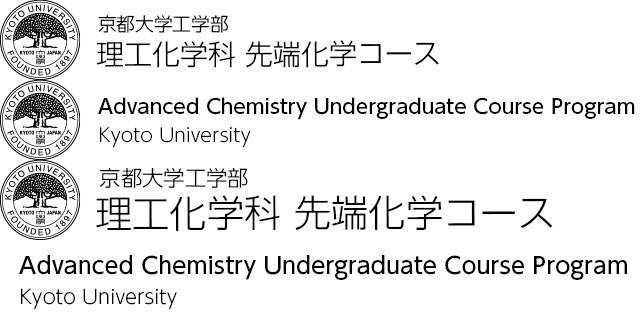Introduction, Principle, Education Policy
Welcome to the Advanced Chemistry Undergraduate Course Program
In the Advanced Chemistry Undergraduate Course Program, students are encouraged to adequately learn the fundamentals during their undergraduate years and then go on to more advanced and specialized research and learning in the graduate school (masters and doctorate programs). Whether one chooses to enter the workforce or continue on to higher education, graduates will find the knowledge of fundamentals in chemistry and science extremely helpful in making choices in the future. The importance of having profound knowledge of fundamentals cannot be overemphasized.
With this strong base, the array of opportunities will increase, and one will have a better perspective in finding an area that is fitting in the wide choices among chemistry related fields. What is more important is that there is no such thing as advanced research without the knowledge of fundamentals. It is possible to do creative and innovative research only when one has a strong base in the fundamentals. This is also the belief of 1981 Nobel Laureate in chemistry, Dr. Kenichi Fukui, who said, "the very important basic research leads to applied research", and "if you're going to do applied research, do basic research first". In the Advanced Chemistry Undergraduate Course Program, the two and half years from the second semester of the second year up until graduation is an important time period for acquiring the skills and knowledge necessary for basic research.
The studies in this Course will appeal to those individuals who are interested in building a strong base in fundamentals/principles, building a base for future creative research, receiving a high quality education of fundamentals from the faculty members who are also leading researchers, learning not only the fundamentals but more, and learning in diverse specialized subjects with the acquired base in fundamentals. When making a choice in Courses, please be aware that it does not necessarily mean that "fundamentals = simple = easy to earn credits".
Advanced Chemistry Undergraduate Course Program Educational Program
An Enriching Fundamental Education
The Advanced Chemistry Undergraduate Course Program offers students (in the latter half of second year to the fourth year) a curriculum that places an importance on solidly learning the fundamentals/principles of chemistry that will be needed in taking active part in the diverse chemistry related fields in their future. The Course has an enriching educational program to ensure the solid learning of the fundamentals, and with that as a base, offers many elective subjects.
The Advanced Chemistry Undergraduate Course Program Curriculum is designed so that students can smoothly make the transition to higher level courses from what they have learned up until the first semester of their second year. With this in mind, the subjects are categorized into Physical Chemistry I, II, III, Organic Chemistry I, II, III, Inorganic Chemistry I, II, Analytic Chemistry I, and Biochemistry I, II. Each subject has two classes (60 students per class) with thorough, detailed instruction.
The Scientific English course has three classes (40 students per class). High quality lectures with small student numbers are provided for the purpose of helping students master the ability to accurately read the latest scientific research papers, and using that as a base, accurately put their thoughts in writing. We are actively incorporating programs to strengthen students' English communication skills.
Introduction to Modern Chemistry and Diverse, Advanced Specialized Subjects
Alongside the education in fundamentals, lectures that place an importance on why these subjects are a necessity to learn and how they are interrelated to the present and future "frontier" will be offered. For this reason, students will take "Introduction to Advanced Chemistry" in the second semester of the second year and "Introduction to Green Chemistry" in the first semester of their third year. Students will have the opportunity to think about how the earth's environment, life and society are interrelated while learning chemistry.
Those students who are interested in continuing deeper studies from the fundamentals and those who want to deepen their knowledge in diverse areas will have the opportunity to do so from their third year, which will cover a wide range of studies and also offer specialized subjects.
Enriching Education and Conscientious Guidance
The Advanced Chemistry Undergraduate Course Program faculty members are involved in the newest research in diverse areas from fundamental chemistry to applied chemistry. It is only possible to energetically teach the fundamentals because of our leading faculty. The Advanced Chemistry Undergraduate Course Program is led by faculty who can provide a high quality and enriching education.
In order to sustain the quality of education, detailed syllabi are made and course contents/grading criteria are announced in advance. An importance is placed upon contact between students and faculty and those opportunities are being increased. The office hours offered at the Yoshida Campus allows students to freely come and ask questions or receive advice.
Plentiful Graduation Research Choices
The Advanced Chemistry Undergraduate Course Program offers a variety of choices for graduation research. The faculty members in this Course are from various laboratories in the Departments of Energy and Hydrocarbon Chemistry, Molecular Engineering, and Synthetic Chemistry and Biological Chemistry. In addition, there are faculty members from the Division of Energy Reactions in the Graduate School of Energy Science, and other cooperating institutions: the Institute for Chemical Research, Institute for Integrated Radiation and Nuclear Science, Institute for Liberal Arts and Science, Fukui Institute for Fundamental Chemistry, and Institute for Integrated Cell-Material Sciences . Therefore, these faculty members conduct the newest research that covers diverse areas in chemistry. Students will have a choice from over 30 research laboratories for their graduation research.
In the Graduate School, these research laboratories belong to the Advanced Chemistry Research Cluster and are awaiting your forthcoming.
